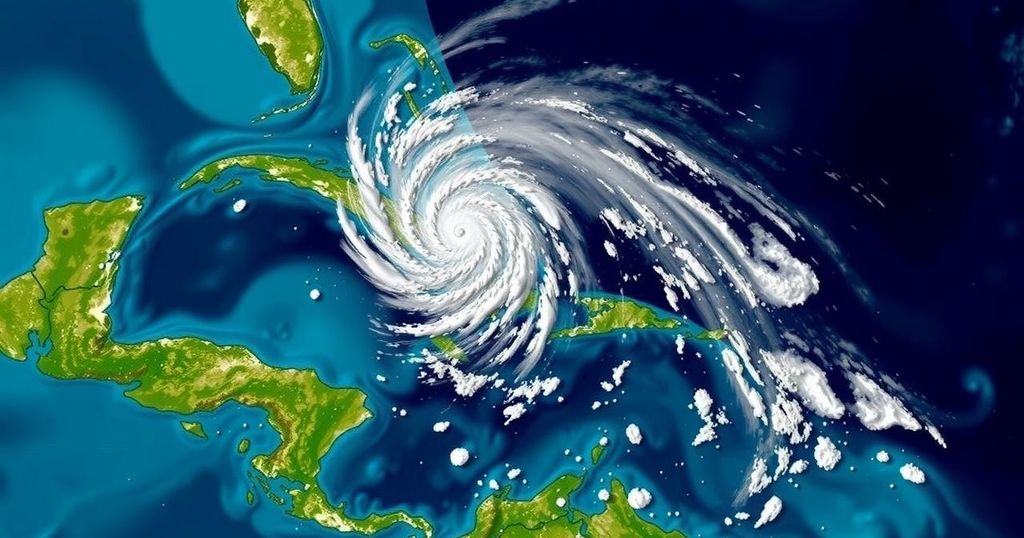Tropical Storm Oscar has weakened after making landfall in Cuba as a Category 1 hurricane, resulting in at least seven deaths and heavy rainfall. The storm became historical as the smallest recorded hurricane, with significant meteorological surprises noted by experts. While it moves toward the Bahamas, additional rainfall is expected. Meanwhile, Hurricane Kristy continues to strengthen in the eastern Pacific without threatening land.
Tropical Storm Oscar has diminished in intensity as it moves toward the Bahamas, following a significant landfall in Cuba where it was initially classified as a Category 1 hurricane. The storm has resulted in the tragic deaths of at least seven individuals and has caused severe rainfall on an island currently grappling with an unrelated massive power outage. As of Tuesday afternoon, the remnants of Oscar were positioned approximately 75 miles east-southeast of Long Island in the Bahamas, with maximum sustained winds having decreased to 35 mph while progressing northeast at a speed of 12 mph, according to information from the National Hurricane Center in Miami. In the southeastern Bahamas and the Turks and Caicos Islands, forecasters anticipate an additional rainfall of up to four inches. Notably, Oscar has made meteorological history as the smallest recognized hurricane, with a wind field measuring merely six miles across. Its unexpected intensification took many meteorologists by surprise when it struck Grand Inagua Island in the Bahamas on Saturday, followed by a second landfall in eastern Cuba on Sunday before it reversed course back towards the Bahamas. Michael Lowry, a hurricane specialist and noted storm surge expert, remarked on the significant forecasting discrepancies surrounding Oscar’s development, stating, “It’s not often we see a colossal failure in hurricane forecasting.” Lowry highlighted that forecasting models failed to predict Oscar’s transition into a hurricane. The impact of Tropical Storm Oscar on Cuba included recorded rainfall levels exceeding 15 inches in some areas of eastern Cuba. This deluge has prompted forecasts of extensive flooding and potential landslides, particularly in the province of Guantánamo where the fatalities occurred. The storm coincided with ongoing struggles in Cuba concerning recovery from widespread electrical outages, which have triggered a series of small protests and stern warnings from the government regarding the consequences of unrest. Oscar, which is the 15th named storm and the 10th hurricane of the current Atlantic hurricane season that extends from June 1 to November 30, reinforces prior predictions by the National Oceanic and Atmospheric Administration. The NOAA anticipates an above-average hurricane season characterized by record-high ocean temperatures, estimating between 17 and 25 named storms, including four to seven major hurricanes of Category 3 or higher during this period. Additionally, long-range forecasts suggest the emergence of another storm in the central Caribbean imminently. In contrast, Pacific Hurricane Kristy has strengthened significantly, moving toward open waters and enhancing its intensity. Located 590 miles west-southwest of Acapulco, Mexico, Kristy is progressing westward at a speed of 18 mph, boasting maximum sustained winds of 75 mph without posing a threat to land or requiring coastal warnings or watches.
Tropical Storm Oscar formed during the Atlantic hurricane season, a time notorious for unpredictable and potentially devastating storms. Styles of forecasting hurricanes have evolved, but the unexpected intensification of Oscar caught meteorologists off guard, signifying challenges in prediction models. The storm’s impact was amplified by pre-existing vulnerabilities in Cuba, including significant infrastructure issues resulting in power shortages, which complicated disaster recovery efforts. As climate conditions shift and ocean temperatures rise, the likelihood of severe weather events is expected to increase, underscoring the importance of advance preparation and accurate forecasting.
In summary, Tropical Storm Oscar has had a marked negative impact on Cuba, where it caused fatalities and severe flooding, revealing vulnerabilities in both weather prediction models and local infrastructure. Its remnants pose a continuing threat as they approach the Bahamas. The NOAA’s warning regarding an above-average hurricane season emphasizes the need for vigilance as additional storms may develop. Meanwhile, Hurricane Kristy in the Pacific operates in a different context, as it strengthens without posing immediate threats to land, highlighting the complexity of weather phenomena across different regions during this hurricane season.
Original Source: gvwire.com






